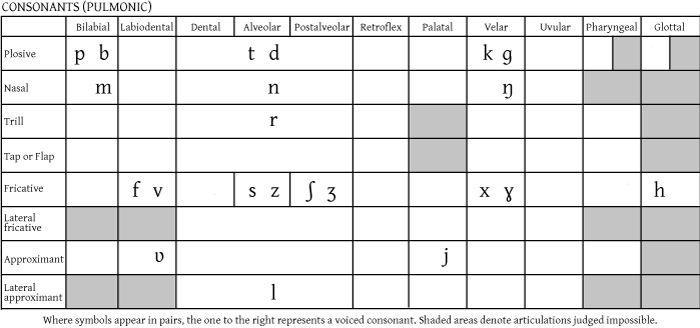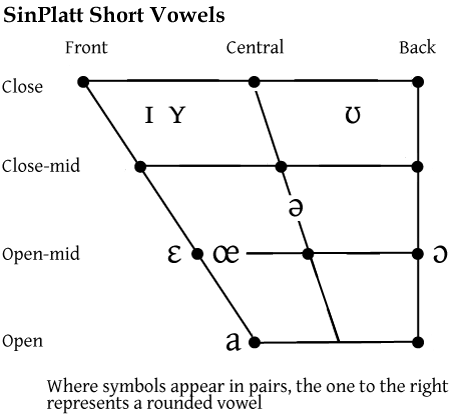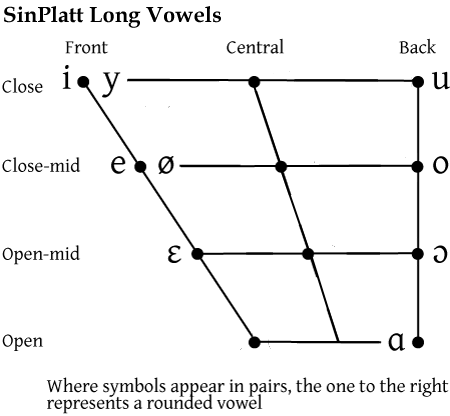SinPlatt
SinPlatt is an a-posteriori Germanic conlang. It is based on English, Dutch, German and Old Saxon. It uses lexical and grammatical features that are present in at least two out of the three of English, Dutch and German. The form of words is based on Old Saxon and Middle Low German, and it has a phonology that is similar to some modern Low German/Low Saxon dialects.
Phonology and Spelling
Consonants
SinPlatt has partially participated in the second Germanic consonant shift: PG *þ has evolved to d; [d] or [t].
Like German and Dutch, voiced stop and fricative consonants de-voice when their inflection puts them at the end of a word:
| Voiced | De-voiced | English |
|---|---|---|
| perden \ˈpɛrdən\ | perd \pɛrt\ | horse |
| bergen \ˈbɛrɣən\ | berg \bɛrx\ | mountain |
| dese \ˈdeːzə\ | des \dɛs\ | this/these |
| wegen \ˈʋeːɣən\ | weg \ʋɛx\ | way |
| ribben \ˈrɪbən\ | ribb \rɪp\ | rib |
| ferderven \fərˈdɛrvən\ | ferderf \fərˈdɛrf\ | to destroy |
Vowels
In the stressed syllable of word stems, SinPlatt has three classes of vowels:
Vowels that are always long.
These vowels normally represent evolution from Proto-Germanic long vowels and dipthongs. These are generally doubled when they are followed by more than one consonant (eg geest, fleesch) or when the the syllable is at the end of the word (eg boom, kääs, düür). If not followed by a consonant cluster, when followed by a suffix, they are written singular (eg bomen, käsig, dürer). Note this class includes diphthongs, and ie and å . Diphthongs don't change spelling or pronunciation when a suffix is added. Neither does ie \iː\. Å/å \ɔː\ is always spelled singular and doesn't change pronunciation (eg mån, månen)
| Without Suffix | With Suffix | English |
|---|---|---|
| afscheed \ˌafˈʃeːt\ | afscheden \ˌafˈʃeːdən\ | farewell |
| good \goːt\ | gode \ˈgoːdə\ | good |
| huus \huːs\ | husen \ˈhuːzən\ | house |
| geest \geːst\ | geesten\ˈgeːstən\ | spirit |
| fleesch \fleːʃ\ | fleeschen \ˈfleːʃən\ | meat |
| kööp \køːp\ | köpen \ˈkøːpən\ | to buy |
| drief \driːf\ | drieven \ˈdriːvən\ | to drive |
| dråd \drɔːt\ | dråden \ˈdrɔːdən\ | thread |
Vowels that are always short.
These are followed by a cluster of 2 or more consonants (eg fisch, hard) and don't change length. These include vowels which were followed by geminated consonants in Proto-Germanic and Old Saxon (eg seggen, brügg.)
| Without Suffix | With Suffix | English |
|---|---|---|
| werp \ʋɛrp\ | werpen \ˈʋɛrpən\ | to throw |
| wind \ʋɪnt\ | winden \ˈʋɪndən\ | wind |
| trepp \trɛp\ | treppen \ˈtrɛpən\ | stair |
| stokk \stɔk\ | stokken\ˈstɔkən\ | stick |
| dünn \dʏn\ | dünne \ˈdʏnə\ | thin |
| bükk \bʏk\ | bükken \ˈbʏkən\ | to bend |
| ding \dɪŋk\ | dingen \ˈdɪŋən\ | thing |
| segg \sɛx\ | seggen \ˈsɛɣən\ | to say |
| sonn \sɔn\ | sonnen \ˈsɔnən\ | sun |
Stretching Vowels.
This is a very common class and a distinctive and prominent feature of the phonology of SinPlatt. These are followed by a single consonant (eg dag, pad, nemen). When their syllable is at the end of word, they are short (eg nem, bef) . When a suffix is added, for example a plural suffix or a verb conjugation or adjective comparative, the vowel “stretches” and becomes long – sometimes changing in quality as well as length. (eg salen, konspirären, paden)
| Without Suffix | With Suffix | English |
|---|---|---|
| aktuäl \aktʊˈɛl\ | aktuäle \aktʊˈɛːlə\ | current, present |
| bar \bar\ | bare \ˈbɑːrə\ | bare |
| bef \bɛf\ | beven \ˈbeːvən\ | to shake |
| blad \blat\ | bladen\ˈblɑːdən\ | leaf |
| eksplosion \ɛksplɔzˈjɔn\ | eksplosionen \ɛksplɔzˈjoːnən\ | explosion |
| gel \gɛl\ | gele \ˈgeːlə\ | yellow |
| kom \kɔm\ | komen \ˈkoːmən\ | to come |
| nat \nat\ | nate \ˈnɑːtə\ | wet |
| weg \ʋɛx\ | wegen \ˈʋeːɣən\ | way |
| son \sɔn\ | sonen \ˈsoːnən\ | son |
| nacional \natsjɔˈnal\ | nacionale \natsjɔˈnɑːlə\ | national |
| lat \lat\ | late \ˈlɑːtə\ | late |
| porträt \pɔrˈtrɛt\ | porträten \pɔrˈtrɛːtən\ | portrait |
Grammar
The grammar includes complex features such as:
Two grammatical genders for nouns (neuter and common). Articles and adjectives decline for gender and number.
Some nouns form the plural using umlaut: eg mann (man) > männen (men).
Some adjectives have irregular comparatives: eg ald (old) > älder (older); good (good) > beter (better).
Verbs decline for person and number and there are large numbers of strong verbs.
Articles
SinPlatt has a gender system very similar to Dutch. Nouns are divided into two classes of grammatical gender – neuter and common. Common is a merger of masculine and feminine.
| Type | Neuter | Common | Plural |
|---|---|---|---|
| Indefinite | een (een huus) | ene (ene fisch) | some (some bomen) |
| Definite | dat (dat word) | de (de mann) | de (de fogels) |
Word Order and Syntax
Word order and syntax are similar to German and Dutch:
Verb Infinitives and Past participles go to the end of the clause or sentence:
Wi hebben de stad spödig antkomen (We have quickly escaped the town)
Ji künt nejt for miene schöne dochter prunken. (You must not show off in front of my beautiful daughter)
Finite Verbs go to the end of subordinate clauses:
Weetst du dat, diene küüsche dochters werklik dernen sien? (Are you aware that your pure daughters are actually sluts?
The prefix of the finite forms of separable verbs go to the end of subordinate clauses:
Si beldt een fals porträt fan küüsche suverheed af. = She portrays a false image of chastity
and purity.
Text Sample
“Ik pries de lüttele husar an,” riep de merketantin. “De junge bürger heft ene modig hert.” Korporal Aubry marschärde forbie uten seggen een word. Acht oder tejn soldaten liepen fort and kåmen med him toosamen. Hi leidede hin toorügg ene grote eek, umgegeven med dornen. Wan kam hi dår, hi settede hin fort de rand fan de busch, noch uten seggen een word, an ene wied gestrekkde front, eelke stond toomindest tejn schreden af siene nåjbuur.
“Ach so männen”, seggde de koporal, hi sprak för de eerst mål, “schiet nejt antoo ik et befel: bedenk, ji hebbt enig drie patronen eelk.”
“Doch, wat geschejt dan?” frågde Frabrice sich. Endlik, wan hi sich alleen med de korporal fand, hi seggde too him: “Ik hebb kene muskett.”
“Eersts, hald diene tung. Gå fort dår: fieftig schreden for de busch, sallst du een fan de arme soldaten fan dat regiment finden, niewlik fan ene sabel gehakkd; du sallst siene rancel and siene muskett nemen. Roof nejt af ene ferwundede mann doch; nem de rancel and muskett af ene gewisse dode, and iel sich oder du sallst fan unsere kameraden geschoten wesen.”
"I recommend the little hussar", called the cantinière. "The young bourgeois has a stout heart." Corporal Aubry marched past without saying a word. Eight or ten solders ran forth and joined him. He led them behind a giant oak, surrounded with thorns. When he got there, he deployed them along the edge of the thicket, still not saying a word, on a widely extended front, each one stood at least ten paces from his neighbor. "So men," said the corporal, speaking for the first time, "don't shoot until I order it: remember, you only have three cartridges each."
"But what's happening then?" Frabrice asked himself. Finally, when he found himself alone with the corporal, he said to him: "I haven't got a musket."
"Firstly, hold your tongue. Go along there: fifty yards in front of the woods, you will find one of the unfortunate soldiers of the regiment, newly cut down by a saber; you shall take his satchel and musket. Don't strip a wounded man though; take the satchel and musket from a properly dead one, and hurry up or you will be shot by our comrades."
Links
SinPlatt-French Dictionary(pdf) [1]
Basic Grammar of SinPlatt(pdf) [2]


